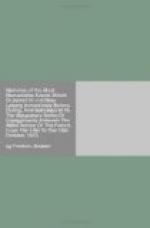For six or eight nights I had not been able to get a moment’s sleep or rest, so that at last I reeled about like one drunk or stupid. The only wonder is that my health was not impaired by these super-human exertions. My dress and general appearance were frightful. When the wounded Swedish officer was brought in, he of course wanted a change of linen. Not a shirt was to be procured any where, and I cheerfully gave him that which I had on my back; so that I was obliged to go without one myself for near three days. Several times during the stay of the French I had assisted in extinguishing fires: even the presence of marshal Ney was not sufficient to make the French in our houses at all careful in the use of fire. Those thoughtless fellows took the first combustible that fell into their hands, and lighted themselves about with it in every corner. They ran with burning wisps of straw among large piles of trusses, and this was often done in the house where the marshal lay, without its being possible to prevent the practice. A French aid-de-camp, in my presence, took fifty segars out of my bureau, just at the moment when I was too busy to hinder him. Whether he likewise helped himself to some fine cravats which lay near them, and which I afterwards missed, I will not pretend to say.
I have suffered a little, you see; but yet I have fortunately escaped the thousands of dangers in which I was incessantly involved. Never while I live shall I forget those days. That same divine Providence which was so manifestly displayed in that arduous conflict, and which crowned the efforts of the powers allied in a sacred cause with so glorious and so signal a victory, evidently extended its care to me. After the battle of Jena, in 1806, Napoleon declared in our city that Leipzig was the most dangerous of his enemies. Little did he imagine that it would once prove so in a very different sense from that which he attached to those words. Here the arm of the Most High arrested his victorious career, of which no mortal eye could have foreseen the termination. I would not exchange the glory—which I may justly assume—the glory of having saved the property of my worthy employer, as far as lay in my power, during those tremendous days of havoc and devastation, for the laurel wreath with which French adulation attempts most unseasonably to entwine the brow of the imperial commander, on account of the battle of Leipzig.




